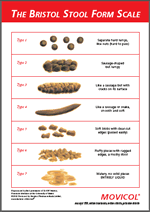Note the information is incomplete for Tuesday, Saturday and Sunday. This highlights the importance of detail to aid correct identification of the problem.


Q. Based on the Bowel Chart above, which one of the list best describes Roberts problem?
Mr Smith’s bowel movements for the week.
| Name: Mr Smith | CHI No: | |||||
| Month: May | Current regime: nil / supps. /small enema given | |||||
| Monday | Tuesday | Wednesday | Thursday | Friday | Saturday | Sunday |
| Type: 7
Time:
|
Type: Faecally Incontinent+++
Time: |
Type: 7
Time:
|
Type: 7
Time:
|
Type: 7
Time:
|
Type: Incontinent++
Time:
|
Type:
Time:
|
Q. Based on the Bowel Chart above, which one of the list best describes Roberts problem?
Acute diarrhoea – Wrong – Caused by possible infection (bacterial/viral) or drug induced (laxatives, antibiotics). Many other episodes might be seen on bowel chart and it may be associated with painful cramping.
Chronic diarrhoea– Wrong – May be more like type 6 on the Bristol Stool Chart. Consult with medical staff.
Faecal impaction with overflow diarrhoea – Correct – Caused by unresolved constipation in the colon and rectum where faecal fluid leaks past solid stool and is often mistaken for diarrhoea. A loaded bowel could possibly be contributing to him not being able to emptying his bladder completely.
Laxative induced diarrhoea – Wrong – Unlikely as Robert’s only laxative in Fybogel™, a bulk-forming laxative.
Irritable Bowel Syndrome – Wrong – Usually there is a known history of this with pain, discomfort, bloating and fluctuation between constipation and diarrhoea.
Inflammatory bowel disease (e.g. Crohns disease, ulcerative colitis) – Wrong – Usually there is a known history of this. Diarrhoea may indicate active inflammation present.
Page last reviewed: 31 Jan 2022


